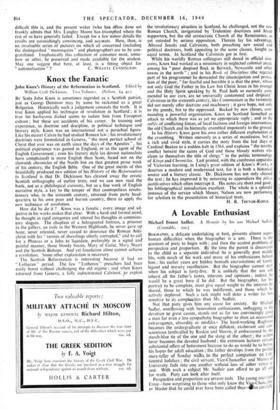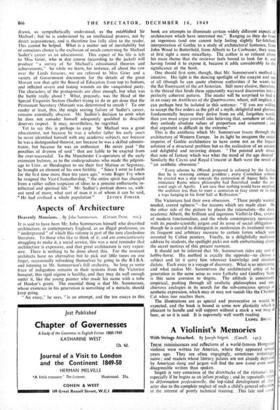A Lovable Enthusiast
Michael Ernest Sadler. A Memoir by his son Michael Sadleir. (Constable. 2os.)
BIOGRAPHY, a delicate undertaking at best, presents almost super- human difficulties when the biographer is a son. There is the question of piety to begin with ; and then the acutest problems of perspective and proportion. By the time the parent is discovered to the child as a separate individual he is generally past middle life, with much of his work and many of his enthusiasms behind him ; his earlier years are hidden beneath encrustations of family legend and nursery recollection. But the biographer cannot start when his subject is forty-five. It is unlikely that the son will inherit all the father's tastes, interests and opinions ; indeed, he would be a great bore if he did. But the biographer, for hi, portrait to be complete, must give equal weight to the interests he shared, those to which he was indifferent, and those which he actively deplored. Such a task might well deter a writer far le., sensitive to its complexities than Mr. Sadleir. Not that piety gives him any cause for anxiety. Sir Michael Sadler, overflowing with benevolent enthusiasms, unflagging in his devotion to great causes, stands out as far too convincingly good a man for even a less sympathetic biographer to shun an occasion-II extravagance, absurdity or mistake... The hard-working Rugbarn becomes the undergraduate at once diffident, exuberant and con- scientious (enthralled by Ruskin and Morris, if embarrassed by the starch-blue tie of the one and the slang of the other) ; the ardent lover becomes the devoted husband ; the extension lecturer refuse; substantial offers of betterment because to do so would be to betray his hopes for adult education ; the father develops from the perfect story-teller of Sunday walks to the perfect companion on Coil• tinental holidays ; the civil servant, Vice-Chancellor and Master of University fade into one another without loss of either virtue er zest. With such a subject Mr. Sadleir can afford to go all out for truth. Piety can look after itself. Perspective and proportion are severer tests. The young uncert3i3 Ernie—how surprising to those who only knew the Vilo-Chameller or Master that he could ever have been called thus—Was carefully
drawn, as sympathetically understood, as the established Sir Michael ; but he is understood by an intellectual process, not by direct acquaintance, and is therefore less fully alive to the reader. This cannot be helped. What is a matter not of inevitability but of conscious choice is the exclusion of much concerning Sir Michael Sadler's career as an educationist. This aspect of his life is left to Miss Grier, who in due course (according to the jacket) will produce " a survey of Sir Michael's educational theories and achievements." So while we learn, for instance, all about the row over the Leeds frescoes, we are referred to Miss Grier and a variety of Government documents for the details of the great Morant row that split the Board of Education from top to bottom, and inflicted severe and lasting wounds on the vanquished party. The characters of the protagonists are clear enough, but what was
the battle really about What, precisely, was the Head of the Special Enquiries Section (Sadler) trying to do or get done that the Permanent Secretary (Morant) was determined to smash ? To one reader at least, this, the single searing failure of Sadler's career, remains essentially obscure. Mr. Sadleir's decision to omit what he does not consider himself adequately qualified to describe deserves respect. It may, nevertheless, be regretted.
Yet to say this is perhaps to carp. Sir Michael was a great educationist, not because he was a scholar (after his early years he never identified himself with any academic subject), nor because he was a distinguished theorist, nor because he was a skilled adminis- trator, but because he was an enthusiast. He never paid " the penalties of dryness of soul " that are liable to be exacted from the over-successful. To the Manchester Co-operators of the early extension lectures, as to the undergraduates who made the pilgrim- age to Univ. or Headington to see their first Matisse or Segonzac, he brought an element of his own fertility. " Since! went to Leeds for the first time more than ten years ago," wrote Roger Fry when he resigned the Vice-Chancellorship, " the entire spirit has changed from a rather sullen suspicion of ideas to a genuine enthusiastic in- tellectual and spiritual life." Mr. Sadleir's portrait shows us, with- out need of more, what sort of man it is of whom it can be said, He had civilised a whole population." LETTICE FOWLER.



































 Previous page
Previous page